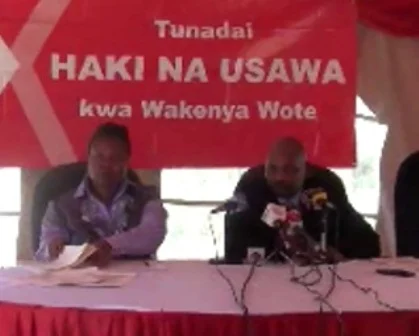Statement Calling Upon Kenyans to Ensure the Integrity of and Accountability for the Upcoming General Elections, 4th March, 2013
The Kenya Human Rights Commission (KHRC) is issuing this position in light of its mandate of working towards a human rights state and society and within the context of the upcoming general elections scheduled for the 4th of March, 2013. The Commission believes that entrenching the culture of constitutionalism especially the implementation of the Constitution of Kenya, pro-people laws and policies and the democratic governance of elections are critical in the realization of this vision.
The upcoming elections are critical as they will be the first under the new constitutional dispensation ushered in by the Constitution of Kenya (2010). Consequently, they will mark an important new step in the governance of our nation. They are also the first national elections to be conducted after the tragic violence that occurred in 2007/2008.
The promulgation of the Constitution of Kenya (2010) was an important step in instituting a culture of accountability, respect for the rule of law, protection of human rights and principles of integrity in the governance of Kenya. Article 3 calls on “every person to respect, uphold and defend” the Constitution. Article 10 of the Constitution provides that national values and principles of governance include: transparency, the rule of law, human rights, non-discrimination and the protection of the marginalized. These values and principles bind all State organs, State officers, public officers and all persons whenever any of them applies or interprets the Constitution, enacts applies or interprets any law; or makes or implements principles of governance.
Furthermore article 73 of the Constitution provides that:
Authority assigned to a State officer is a public trust to be exercised in a manner… that brings honour to the nation and dignity to the office; and promotes public confidence in the integrity of the office.
We note that all elective offices to be contested in the elections are state offices and that therefore our new President, Parliamentarians, Governors and Members of the County Assemblies will be bound by the provisions of Chapter Six of the Constitution and article 73.
We note with regret that, to date, only six individuals have been prosecuted and convicted[1] for their role in the post-election violence and that many Kenyans are still homeless as a result of politically related violence[2]. The issue of justice for victims and survivors of the 2007/2008 post-election violence is yet to be addressed; this amongst other factors therefore casts a shadow over the upcoming general elections.
It is on the basis of the foregoing that we register our strong disagreement with the decision delivered on 15th February, 2013 by the High Court in Petition Number 552 of 2012 (as consolidated) on the question of the interpretation and enforcement of the leadership and integrity provisions of Chapter Six of the Constitution. We are of the opinion that this decision is erroneous in law and greatly undermines Article 22 of the Constitution.
Specifically, the decision to award costs to the Respondents sets a bad precedent on the conduct of public interest litigation. The ruling on costs is particularly chilling to individual citizens who wish to exercise their right to defend and/or protect the Constitution through courts. The ruling is a complete negation of Article 3, which obligates citizens to defend and protect the Constitution. It is therefore unfortunate that the High Court, having the jurisdiction to interpret the Constitution, chose to abdicate this duty to other constitutional bodies, which have in the past demonstrated their inability and unwillingness to interpret and implement the Constitution, especially in regard to Chapter Six.
We take this opportunity to remind Kenyans that Kenya’s legacy of impunity as manifested in inequality, failed institutions and bad governance practices led to the macabre scenes of violence experienced in the country in 2007/2008. Respect for the Constitution, and in particular the Bill of Rights and Chapter Six on Leadership and Integrity, is therefore absolutely critical to promoting a culture of constitutionalism.
The Kenya Human Rights Commission does not endorse any political party, or alliance of political parties. The KHRC is committed to the rule of law and respect for human rights. We therefore reject the election and appointment of any individual credibly implicated in and accused of any crimes and misconduct including crimes against humanity; economic crimes, gross human rights violations, moral turpitude or violations of any provisions of the Constitution. No matter who wins the March 2013 general elections, the KHRC will continue to engage in an active, peaceful campaign against impunity and will undertake a campaign to vindicate the values contained in our Constitution. We therefore call upon Kenyans to ensure that the upcoming elections meet the highest threshold of the rule of law, integrity, transparency, accountability, equality and respect for human rights.
Thank you
Signed:
Professor Makau Mutua, Chairperson, the Kenya Human Rights Commission
Ms. Betty Murungi, Deputy Chairperson, the Kenya Human Rights Commission
Mr. Davinder Lamba, Member of the Board of the Kenya Human Rights Commission
Professor Karuti Kanyinga, Member of the Board of the Kenya Human Rights Commission
Ms. Mumina Konso, Member of the Board of the Kenya Human Rights Commission
Mr. Mwambi Mwasaru, Member of the Board of the Kenya Human Rights Commission
Mr. Tade Aina, Member of the Board of the Kenya Human Rights Commission
Ms. Atsango Chesoni, Executive Director of the Kenya Human Rights Commission
[1] See, Human Rights Watch Report of 2011 entitled Turning Pebbles available online at: http://www.hrw.org/sites/default/files/reports/kenya1211webwcover_0.pdf
[2] Refer to KHRC and ICJ Kenya Report of 2012 entitled Elusive Justice available online at www.khrc.or.ke/resources/publications/doc.../45-elusive-justice.html


